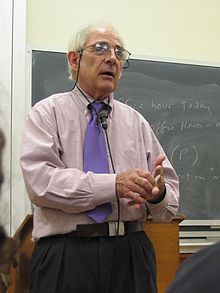
Interesting piece on John Searle by Frank Free
man at Weekly Standard:
Mistake Number One is the idea “that there is some special problem about the relation of the mind to the body, consciousness to the brain, and in their fixation on the illusion that there is a problem, philosophers have fastened onto different solutions to the problem.” Mistake Number Two “is the mistake of supposing that we never directly perceive objects and states of affairs in the world, but directly perceive only our subjective experiences.”
So that’s all right then. All the people who perceive a problem can just take a well-deserved break.
A proponent of Direct Realism, Searle argues,
Like Wittgenstein, but with less openness, he seems to assume that there is nothing to be said about metaphysics:
As the problem of life is now seen as a biological problem—vitalism is out of the question—so I believe the problems of consciousness and intentionality are also biological problems—metaphysical dualism is out of the question—even though the details of the solutions to the problems are by no means obvious to us now.
But why are vitalism and metaphysical dualism out of the question? As Searle himself writes later, “Always beware of what a philosopher takes for granted as so obvious as to be not worth arguing for.” More.
Prediction: naturalism of any kind will prove about as useful to the study of consciousness as it has to astrobiology.
See also: Neuroscience tried wholly embracing naturalism, but then the brain got away
and
See also: What great physicists have said about immateriality and consciousness.
You know there is a problem when great physicists see something immaterial about consciousness but philosophers try to explain it away.
Note: Direct Realism is not to be confused with William Dembski’s informational realism
Follow UD News at Twitter!